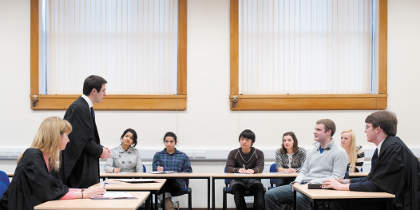
June 21, 2013, by Teaching at Nottingham
Small group teaching for undergraduates in the School of Law
Prof. Stephen Bailey: “Small group teaching has been a feature of the Undergraduate programme in Law for at least forty years, and indeed probably throughout its history. Forty years ago, almost all law subjects were taught by a combination of lectures and tutorials. Most were year-long (semesters were not introduced by the University until much later) and there would be 10 or 11 rounds of tutorials with groups of four or five students, held fortnightly. There were no (summative) examinations in January. This structure became unsustainable as a result of the heavy cuts to public funding per student in Higher Education in the 1980s. Many law schools which had had small group teaching replaced it with “seminars” with much larger numbers. The Law School at Nottingham chose to retain tutorials, but increased the numbers in each group from four/five to eight and (in the context of the introduction of semesters and modularisation) reduced the number of tutorial rounds for each subject to eight. We also did introduce some smaller optional modules taught entirely by seminars, with up to 30 students. However, each of the seven (30 credit) Foundation Subjects required for recognition of the LLB and BA (Law) degrees as Qualifying Law Degrees (covering the first stage of the route to qualification as a solicitor or barrister) and all 15 and 30 credit options with larger student numbers are taught by lectures and tutorials. Most tutorials take place in staff offices. Keeping the number to eight enables all to sit round a table in many (although not all) the teaching rooms available.
“We believe that the retention of small group teaching on the basis we operate has proved popular with our students. Tutorials are carefully integrated with the programme of lectures. Tutorials are conducted by both full-time academic staff and a range of part-time tutors. The latter make an essential contribution to the School’s teaching, alongside academic staff, and bring a range of skills and experiences. Some have previously held academic posts at the University of Nottingham or at other Law Schools. Some are practising or retired legal practitioners. Two are part-time judges. An important contribution is also made by PhD students from the Law School. For those who wish to pursue academic careers, tutorial teaching for the School forms an essential part of their development. Part-time teachers are subject to student evaluation, which is overwhelmingly highly positive.
“Small group teaching provides many benefits. It encourages direct interaction and debate between each student and the teacher. A particular benefit is that it helps ensure that the issues focused on in each tutorial are those that the students in that particular small number have found most difficult. It enables teachers, in the course of a discussion, to encourage students to formulate their arguments with precision and rigour. It encourages students who are not inclined to speak out in front of large numbers of people to have their voice heard and respected. For some students it may provide a necessary incentive for them to read and prepare, providing, in effect, deadlines for work to be done otherwise only achieved by required coursework. It is hard to hide in a group of eight; much easier in a group of 20 or 30. Overall, the result is a more personalised student experience than one confined to presence in very large lecture classes, a (less) large seminar room and an examination hall in the Sports Centre.
“The Law School regards small group teaching as an essential feature of the teaching and learning experience.”
Professor Stephen Bailey
Head of the School of Law
No comments yet, fill out a comment to be the first

Leave a Reply